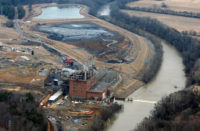President Trump’s executive order that rescinded his predecessor’s policy to boost long-term resilience in communities due to climate-change effects appears to be at odds with new U.S. Dept. of Housing and Urban Development hurricane-rebuilding block grants that have references to rising sea levels. The funds, to states and territories hard hit in 2017, total $7.4 billion.
An agency notice that accompanies the grants seeks “a description of how the grantee plans to promote sound, sustainable, long-term recovery planning informed by a post-disaster evaluation of hazard risk “that takes into account continued sea-level rise.” Texas was awarded $5 billion, Florida $615.9 million, Puerto Rico $1.5 billion and the U.S. Virgin Islands $242.6 million.
Joel Scata, a Natural Resources Defense Council attorney, told ENR that “seeing it in HUD’s document was a bit of a shock, but they made the right decision.” He said it makes no financial sense to rebuild a damaged area in the same vulnerable way based on his belief that future storms will be more severe due to climate change.
Rebuilding plans submitted to HUD for approval must include a description of how work will advance long-term resilience. Specifically, all residential housing and mixed-use structures located in the 100-year flood zone that are rebuilt or substantially repaired must be elevated so their lower floor is at least 2 ft above the base flood-evaluation floodplain. Critical structures such as hospitals, police stations and utility lines located in the 500-year floodplain must be 3 ft above the ground.
Hurricane Harvey hit South Texas on Aug. 25 with 130-mph winds and caused at least $125 billion in damage, primarily flood impacts in Houston. Hurricane Irma peaked at 185 mph on Sept. 6 as it hit the Virgin Islands; it hit South Florida four days later with 130-mph winds. The Florida Office of Insurance Regulations says total estimated insured losses are more than $5.8 billion. Hurricane Maria also hit the Virgin Islands before devastating Puerto Rico on Sept. 20, generating damages estimated at $95 billion.





Post a comment to this article
Report Abusive Comment